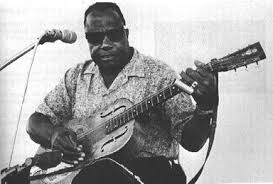Bukka White, born Booker T. Washington White on November 12, 1909, in Houston, Mississippi, was a legendary American blues guitarist, singer, and songwriter. He became one of the most influential country blues musicians of the 20th century, known for his powerful vocals, driving slide guitar style, and deeply emotional songwriting.
Early Life and Musical Roots
White was raised in a musical family and exposed to a wide range of musical influences, from gospel music in church to the rural blues traditions of the Mississippi Delta. His first instrument was the fiddle, but he later turned to the guitar, where he developed a signature sound rooted in the Delta blues.
He was also a cousin of blues great B.B. King, though the two had different styles and generations. As a young man, Bukka White was inspired by artists such as Charley Patton, and his early music reflected the raw and emotional tone that would later define the Delta blues tradition.
Early Recordings and Struggles
White first recorded in 1930 for Victor Records under the name Washington White, cutting a mix of gospel and blues numbers. However, his initial recordings didn’t gain much traction, and he returned to the South to continue performing locally.
In 1937, White found himself entangled in a legal issue that led to a prison sentence at Mississippi State Penitentiary (Parchman Farm). Remarkably, while serving his time, he recorded several songs for the American Record Corporation (ARC), including the notable track “Shake ‘Em On Down”, which became a significant hit and remains one of his most recognized songs.
Signature Style and Musical Legacy
Bukka White’s style was deeply rooted in the traditional Delta blues but stood out due to his aggressive slide guitar playing and the resonant tone of his favored National Steel guitar. His vocal delivery was forceful and intense, often telling vivid stories of Southern life, hardship, and resilience.
After his release from prison, White continued to record and perform, but it wasn’t until the 1960s blues revival that he was rediscovered by a new generation of fans. His 1963 self-penned letter to John Fahey and ED Denson, prominent figures in the folk-blues movement, led to a renewed interest in his music.
Later Years and Recognition
The rediscovery of Bukka White during the 1960s led to new recordings and concert tours, including appearances at folk and blues festivals across the United States. He recorded for labels such as Takoma Records and Arhoolie, and released albums like “Sky Songs Vol. 1 and 2” that showcased his raw power and storytelling prowess.
In his later years, White became a respected elder statesman of the blues, influencing a wide range of artists across genres. He passed away on February 26, 1977, in Memphis, Tennessee, leaving behind a legacy that still echoes through the blues community.
Legacy
Bukka White’s music continues to be celebrated for its authenticity, passion, and unique voice in American blues history. His songs have been covered by numerous artists, and his influence can be heard in the work of musicians ranging from B.B. King to modern blues revivalists.
In 1990, White was posthumously inducted into the Blues Hall of Fame, an honor that underscores his contribution to American music.


No responses yet